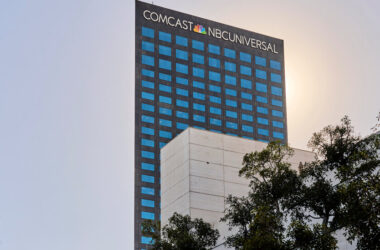The news business is in upheaval. A presidential election is barreling down the pike. Facing financial challenges and political division, several of America’s largest news organizations have turned over the reins to editors who prize relentless reporting on a budget.
And they all happen to be British.
Will Lewis, a veteran of London’s Daily Telegraph and News UK, is now the chief executive of The Washington Post, where reporters have raised questions about his Fleet Street ethics. He recently ousted the paper’s American editor and replaced her with a former colleague from The Telegraph, dumbfounding American reporters who had never heard of him.
Emma Tucker (formerly of The Sunday Times) took over The Wall Street Journal last year, shortly after Mark Thompson (formerly of the BBC) became chairman of CNN, where he has ordered an American remake of the long-running BBC comedy quiz show “Have I Got News for You.”
They joined a slew of Brits already ensconced in the American media establishment. Michael Bloomberg, a noted Anglophile, hired John Micklethwait (former editor of the London-based Economist) in 2015 to run Bloomberg News. Rupert Murdoch tapped Keith Poole (The Sun and The Daily Mail) to edit The New York Post in 2021, the same year that The Associated Press named an Englishwoman, Daisy Veerasingham, as its chief executive.
“We are the ultimate trophies for American billionaires,” joked Joanna Coles, the English-born editor who in April became head of The Daily Beast, the online news outlet itself named after a newspaper in an Evelyn Waugh novel. Ms. Coles has not hesitated to recruit more of her compatriots, installing a Scot as editor in chief and a Guardian reporter as Washington bureau chief.
“We are loading up on Brits,” she said in an interview.
Theories abound as to the enduring appeal of British editors to American proprietors. The accent has its own worldly allure. But hard-nosed, scrappy journalism is a cherished tradition in Britain, where broadsheets and tabloids have battled it out for decades, often on budgets dwarfed by American rivals.
British journalists tend to be lower paid than their American counterparts, an advantage for many news organizations already facing cutbacks. And while Fleet Street has a reputation for fuzzy ethics, that goes hand in hand with a reader-pleasing willingness to scorch sacred cows.
“I do think that the British press is much less self-important, and what I call the elite press in the U.S. is far more sententious about their place in the world,” Tina Brown, the former editor of Vanity Fair, The New Yorker and The Daily Beast, said in an interview.
She added that the erosion of the American news industry also meant that owners had fewer homegrown leaders to choose from.
“If you are looking for a new person to run The Washington Post, what is commensurate in terms of an institution right now?” Ms. Brown said. “What’s left? So many newspapers have died that you’re looking at a much smaller pool of people who are trained to do that particular role.”
Ms. Brown kicked off the trans-Atlantic convoy in 1984 when Condé Nast hired her to edit Vanity Fair. Her highly English mix of impertinence, acerbic prose and class obsession turned the then-flailing magazine into a success. She was soon joined at Condé Nast by Anna Wintour, whose father was the longtime editor of London’s Evening Standard.
“Americans think we’re less expensive and more cutthroat,” Ms. Wintour, the editor of Vogue since 1988 and chief content officer of Condé Nast, wrote in an email. “It’s also true that news is so much a part of British culture that it’s in our blood — a bit like football, or humor, or Shakespeare.
“British journalists also tend to be hardened. News is a rough-and-tumble business in the U.K. — has been for centuries — and so when American media companies feel they need to fight to stay relevant, or profitable, it’s perhaps natural that they’d look across the Atlantic.”
Ms. Coles agreed with that assessment. “British people tend to be good with fewer resources,” she said. “The industry’s in crisis, and Brits are unflappable in crises.”
Plus, Ms. Coles added, the current malaise in American politics, and the fear that the country’s global power is waning, feel old hat for the British.
“The end of empire is a very familiar scenario for us, so we are not daunted by it,” she said.
British editors also have a solid track record.
Ms. Wintour and Ms. Brown were so successful that for a period, British journalists ran Details, National Review, The New Republic, Self, Condé Nast Traveler and Harper’s Bazaar. Mr. Thompson of CNN, who became an American citizen this year, is credited with reviving the fortunes of The New York Times during his eight-year tenure as chief executive.
There has been the occasional misfire. In 1992, Ms. Brown lured Alexander Chancellor, the Old Etonian former editor of The Spectator, to The New Yorker and put him in charge of its “Talk of the Town” section, famed for its sophisticated take on Manhattan life. Shortly after his arrival, Mr. Chancellor, who died in 2017, told colleagues that he had stumbled on an amazing story: a gigantic Christmas tree outside Rockefeller Center.
The article was quietly killed. And Mr. Chancellor was out of a job a few months after that.
This most recent crop of British imports may be explained by the newfound scarcity in the American news business. Ms. Tucker and Mr. Thompson have overseen layoffs and budget cuts; Mr. Lewis has warned his staff that The Post lost $77 million last year, and its readership has fallen by half since 2020.
But while British journalists are used to intense competition, their journalistic rule book is not always in line with American standards. At The Washington Post, the home of Woodward and Bernstein, some of Mr. Lewis’s behavior has unsettled the newsroom.
The New York Times reported on Wednesday that Mr. Lewis had urged The Post’s former editor, Sally Buzbee, to not cover a court decision concerning his involvement in Rupert Murdoch’s phone-hacking scandal in Britain. (A spokeswoman for Mr. Lewis has said that account of the conversation was inaccurate.) An NPR reporter then disclosed that Mr. Lewis had offered an exclusive interview if the reporter agreed to drop an article about the scandal. (The spokeswoman said that Mr. Lewis had spoken with NPR before joining The Post, and that after he joined The Post interview requests were “through the normal corporate communication channels.”)
This kind of behavior may be acceptable at some London papers, where proprietors are less hesitant to fiddle with coverage. In American newsrooms, it’s verboten — as is the practice of paying for information. At The Telegraph, Mr. Lewis reportedly spent 110,000 pounds for documents that fueled a damaging exposé of parliamentary corruption. (His rivals at The Sun and The Times of London balked at a similar deal.) The Telegraph reporter who secured the documents, Robert Winnett, is set to become The Post’s editor later this year.
As for the view across the pond?
“We are all greeting this with a mix of amusement and indignation,” said one Fleet Street editor, who requested anonymity to avoid the ire of any overly sensitive superiors. (In keeping with the spirit of British tabloids, the request was granted.)
“Amusement that these fancy high priests of American journalism are being monstered by good old-fashioned, tough-guy British editors; indignation that they find it so extraordinary that they might have something to learn from across the pond,” the editor said. “Yes, our standards are a bit lower, but we’re extremely competitive and intense and no-nonsense, and that’s probably helpful given how the industry is going.”
Benjamin Mullin and Katie Robertson contributed reporting.





